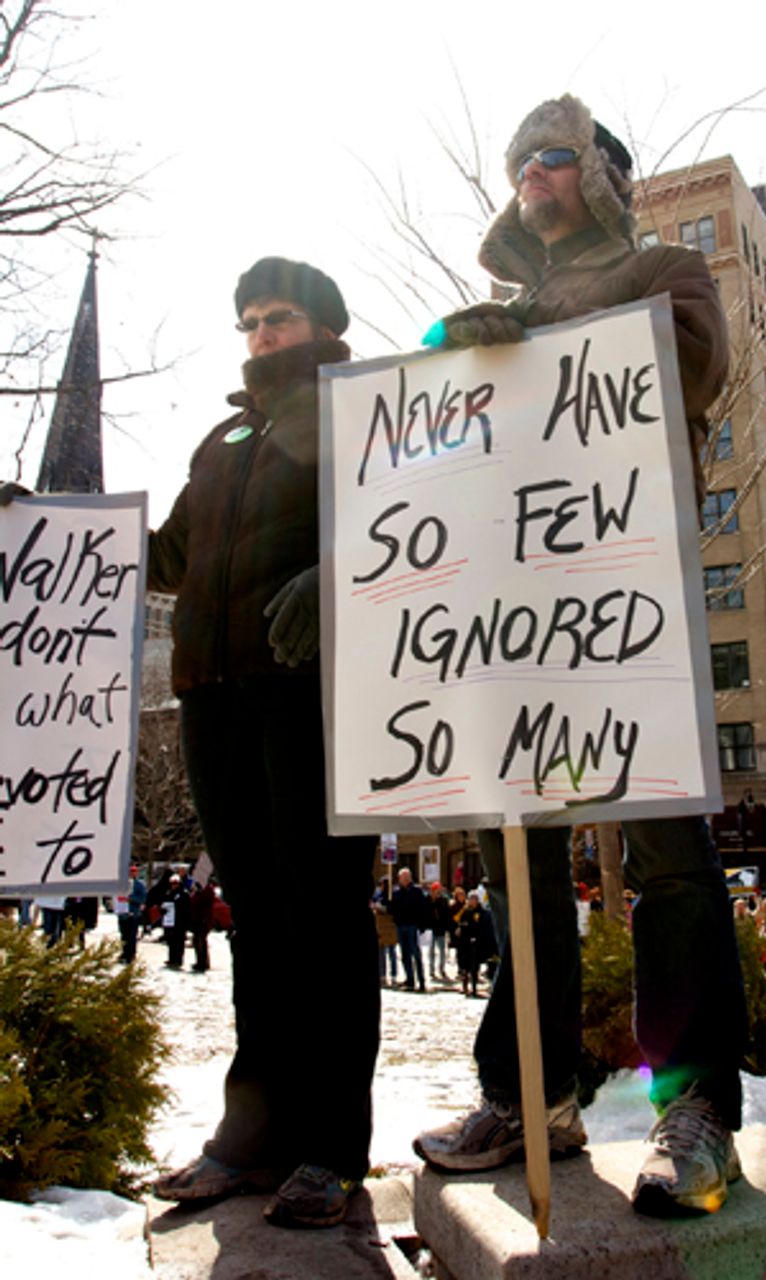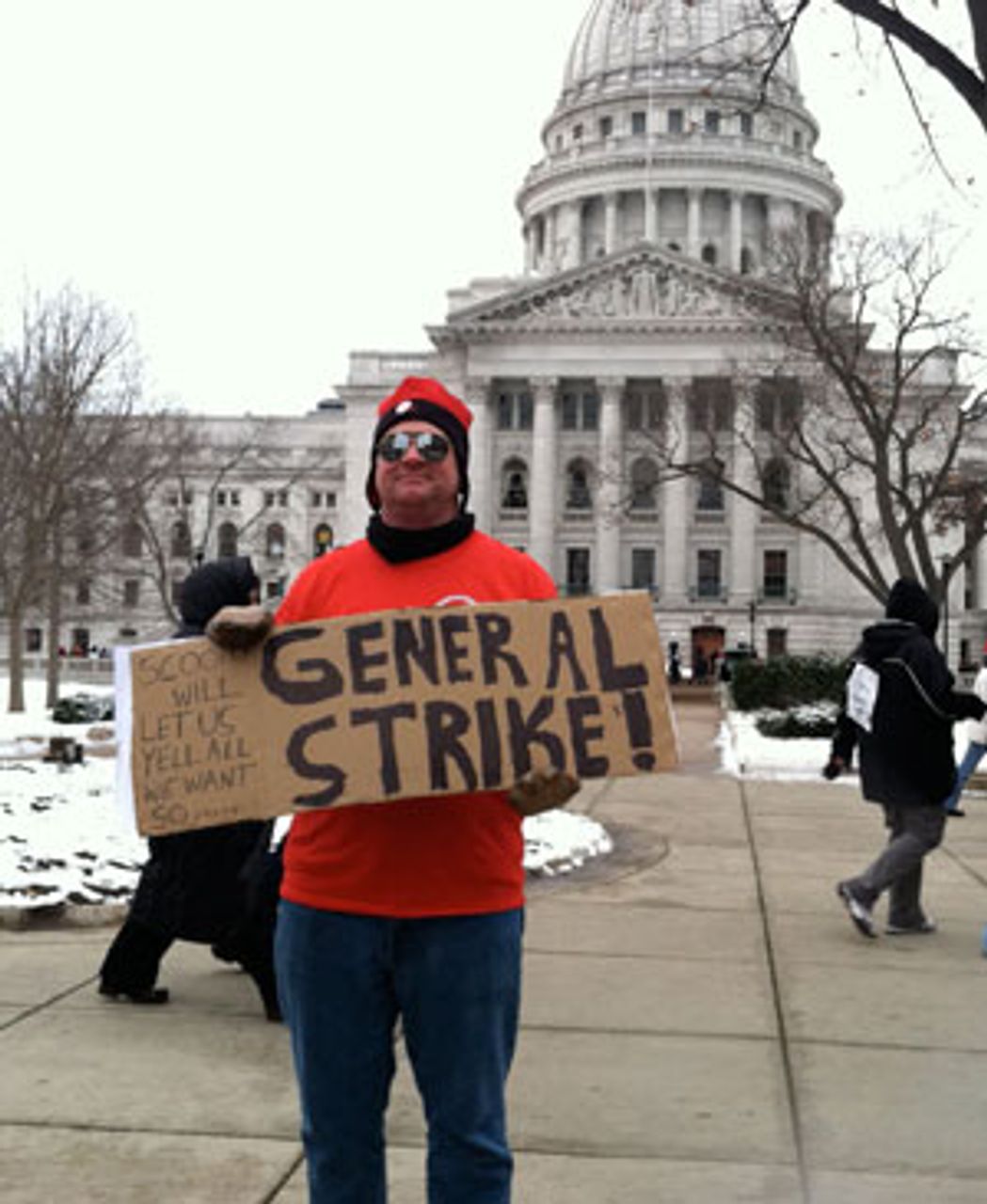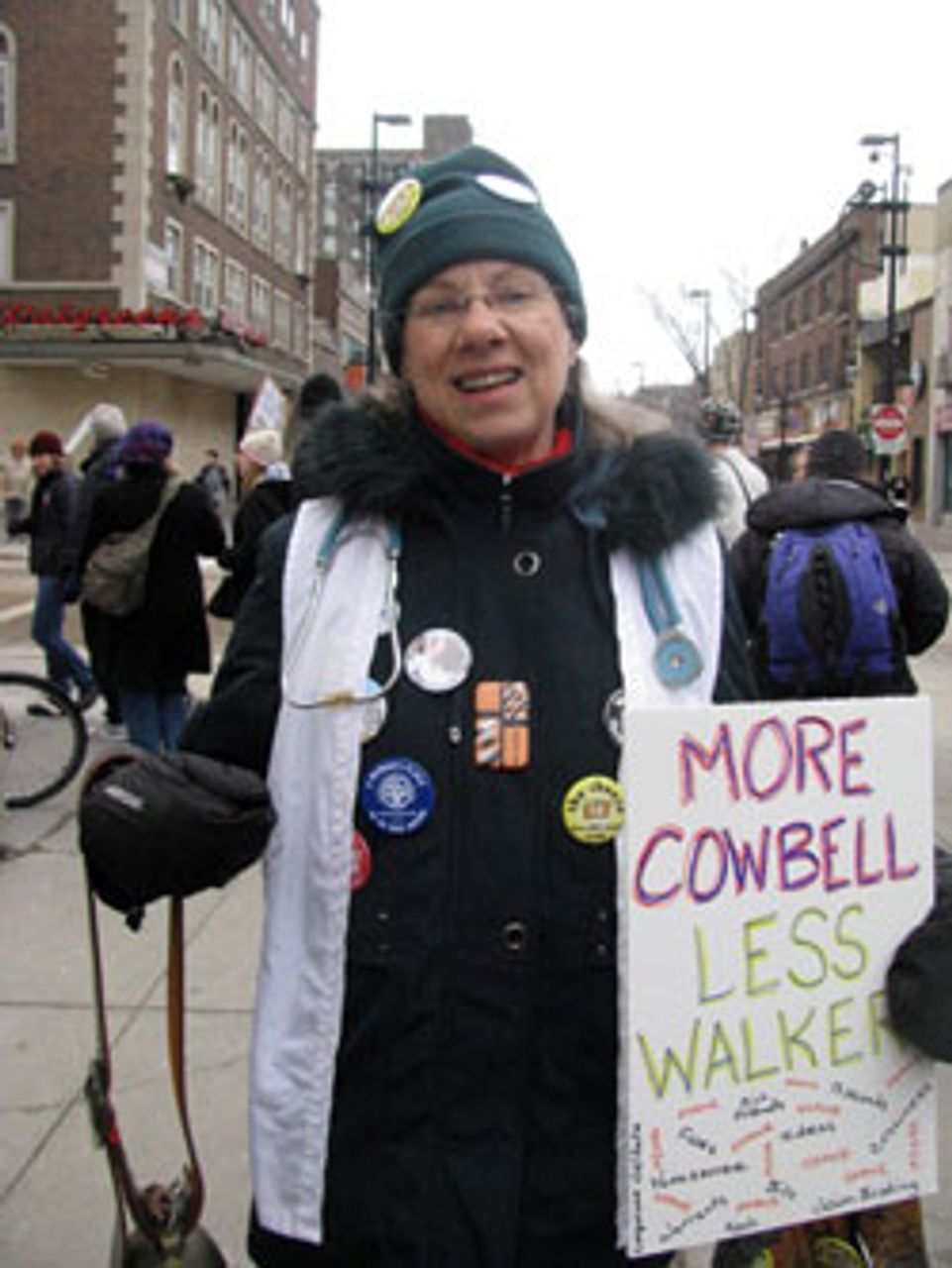 Workers at the demonstration in Madison on Sunday
Workers at the demonstration in Madison on SundayAs many as 50,000 workers and young people braved cold weather to demonstrate in the Wisconsin state capital of Madison Saturday, with another 15,000 coming out on Sunday to oppose the attack on public employees and the $1.5 billion in social cuts that have been announced by Governor Scott Walker.
Teachers, firefighters, nurses and other public employees were joined by union and nonunion private sector workers in construction, steel, auto, trucking and other industries, along with thousands of college and high school students who marched around the state capitol building.
Workers came from all over Wisconsin and many traveled hundreds of miles from Michigan, Illinois and other states to join the protest. There were also many professionals, including doctors, engineers, professors and lawyers, angered by the slashing of the BadgerCare health program and funding for the University of Wisconsin and state colleges.
 Jesse Lyne, a substitute teacher from Madison,
Jesse Lyne, a substitute teacher from Madison,carried a sign for a general strike
Talk of a general strike was in the air, with many workers coming to the conclusion that they had to go beyond daily protests at the state capitol to defeat Governor Walker’s escalating attacks. Summing up this sentiment, a teacher from Madison, carried a sign saying, “Scooter will let us yell all we want so…General Strike!”
Supporters of the Socialist Equality Party passed out thousands of copies of the statement, “Walker must go! For a general strike in Wisconsin!” which calls for a general strike of all Wisconsin workers to force the immediate resignation of Walker and his entire administration. It also called for a rejection of all economic concessions and the demand for an increase in social spending; a rejection of the attack on the rights of workers to negotiate and strike; and for a substantial increase in taxes on corporate profits and the very rich to cover the budget deficit and the costs of new and essential social spending.
 Doctors, nurses and medical students protested Saturday against cuts in Badger Care health programs
Doctors, nurses and medical students protested Saturday against cuts in Badger Care health programsSEP supporters also warned that the state Democrats were holding backroom discussions with Walker and were preparing to cave in to his demands. That is why workers had to rely on their own strength to drive out Walker and defeat his reactionary demands.
This received a strong response from workers. Alice Schneiderman, a nursing student at Madison Area Technical College—which will see a 30 percent cut in its budget—said, “If the Democrats make a deal with Walker, we’ll have no recourse but to get together and launch a general strike.”
In the three weeks since the demonstrations started in Wisconsin, there has been a significant shift in the balance of political forces. After Governor Walker announced his “budget repair bill”—which imposes hundreds of dollars in monthly health care and pension co-pays on public workers and guts collective bargaining rights of workers—the state AFL-CIO and teachers unions were prepared to do nothing more than lobby the state legislature and organize pro forma demonstrations. However, opposition from rank-and-file workers erupted into mass demonstrations, job actions by teachers and high school walkouts.
 Student at Saturday's demonstration
Student at Saturday's demonstration In an effort to contain and smother this movement, the leaders of the top unions, working with state Democrats, announced they would accept all of Walker’s economic demands. If he dropped his effort to undermine the legal status of the unions, they promised, the union officials would help Walker impose his budget-cutting plans, just as they were doing in states with Democratic governors.
But Walker made it clear he was not backing down. The attack on collective bargaining rights was aimed, not at the cowardly trade union officials, but blocking the resistance of the working class to his corporate-backed agenda. On March 1, the governor announced a budget plan to bankrupt school districts and local governments around the state, compelling them to destroy the jobs and living standards of tens of thousands of public employees, while reducing services to the bones. Further cuts would hit health care and higher education, while tens of millions in tax cuts would be handed over to the rich.
The Democratic state senators—who fled the state to block a vote on the collective bargaining measures—fully agree that the working class must pay for the state’s deficit. Under Walker’s Democratic predecessor—Jim Doyle—they carried out the deepest cuts in state history.
Having failed to convince senate Republicans to oppose Walker’s plans, state Democrats are now holding negotiations with Walker to reach a deal that would allow them to come back to Madison so the Budget Repair bill could be passed, and the budget cuts proceed.
According to the Milwaukee Journal Sentinel this might include Walker dropping a provision that the unions would have to conduct yearly votes to be recertified as bargaining agents in exchange for allowing the bill to go through with the vast majority of anti-worker measures left intact.
The mood of the demonstrators was not one of compromise, let alone surrender. Protesters held signs denouncing the budget deficit as a fraud and demanding, “tax the rich,” and “we didn’t create this crisis; don’t make us pay for it.”
Well aware of this, none of the official speakers during this weekend’s demonstrations dared to acknowledge that they had already agreed to Walker’s economic demands, and were more than willing to implement his budget cuts, if he only agreed to work with them.
The keynote speaker at Saturday’s rally was filmmaker and Democratic Party supporter Michael Moore. While he sought to tap into the widespread anger against the claim that Wisconsin and America were “broke”—noting that America’s 400 richest people “have more loot, stock and property than the assets of 155 million Americans combined”—Moore sought to bolster illusions in the Democrats just as they were about to cave in.
“It’s so impressive to the rest of the country that the 14 senators still refuse to participate in the scam of the century! These 14 senators will go down in the labor history books of America”, and “we will never forget their courage!”
Workers are beginning to suspect they cannot rely on the Democrats, and the most thoughtful are considering what to do when they capitulate. “If the unions can get collective bargaining, they are going to roll over. That’s the problem,” said Alyssa Ray-Alden, a student at University of Wisconsin—Milwaukee, speaking with friends at a coffee shop by the capitol.
“The Democrats are fine with taking the cuts, but workers have realized that if these cuts go through, they just won’t be able to live. They just don’t have that kind of play in their budget,” she added.
 Janet Murphy
Janet MurphyJanet Murphy, a registered nurse, said, “We can’t stay where we are now. I’m for a general strike. If the Democrats come back and the governor’s proposals come true—that would be the time for a general strike.”
Jesse Lyne, a substitute teacher in Madison, was carrying a sign calling for a general strike. He told the WSWS, “We need a general strike. We have to shut down the whole state unless they kill this bill and budget. Walker is gutting BadgerCare and education, and selling off the publicly owned power plants.
“We should not accept this. I was at an earlier rally and [Wisconsin Education Association Council President] Mary Bell, said, ‘We have agreed to all of the governor’s economic demands—we just want collective bargaining.’ I yelled back, ‘Who agreed? I never did!’”
“If the Democratic state senators come back with a deal we’ll have unions in name only.
“The rank and file are going to have to take it—the wealthy aren’t going to give us what we need for education, jobs and health care. This demonstration is good—it shows that we are all pissed—but when push comes to shove we have to take it.”
